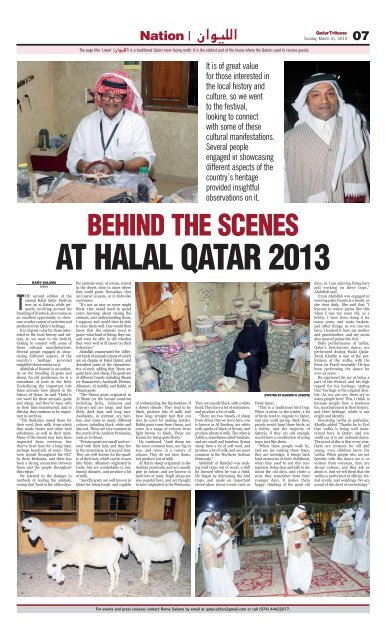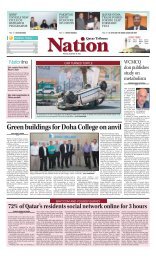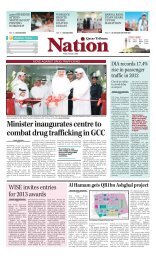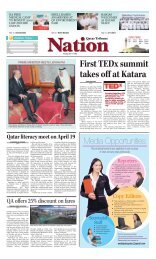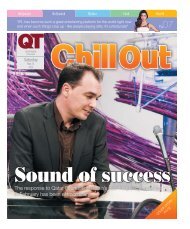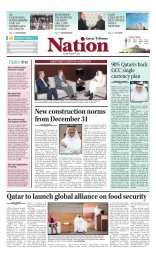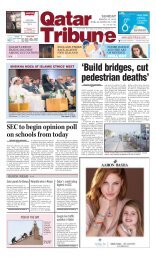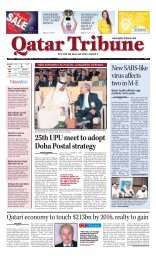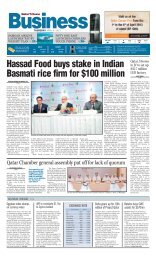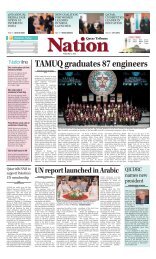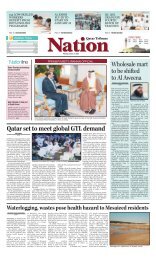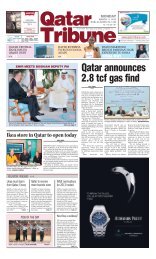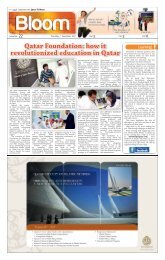Karzai hopeful of Taliban joining mainstream - Qatar Tribune
Karzai hopeful of Taliban joining mainstream - Qatar Tribune
Karzai hopeful of Taliban joining mainstream - Qatar Tribune
Create successful ePaper yourself
Turn your PDF publications into a flip-book with our unique Google optimized e-Paper software.
Nation |<br />
Sunday, March 31, 2013 07<br />
The page title ‘Liwan’ (<br />
) is a traditional <strong>Qatar</strong>i room facing north. It is the coldest part <strong>of</strong> the house where the <strong>Qatar</strong>is used to receive guests.<br />
It is <strong>of</strong> great value<br />
for those interested in<br />
the local history and<br />
culture, so we went<br />
to the festival,<br />
looking to connect<br />
with some <strong>of</strong> these<br />
cultural manifestations.<br />
Several people<br />
engaged in showcasing<br />
different aspects <strong>of</strong> the<br />
country’s heritage<br />
provided insightful<br />
observations on it.<br />
BEHIND THE SCENES<br />
AT HALAL QATAR 2013<br />
RAMY SALAMA<br />
DOHA<br />
THE second edition <strong>of</strong> the<br />
annual Halal <strong>Qatar</strong> Festival,<br />
now on at Katara, while primarily<br />
revolving around the<br />
breeding <strong>of</strong> livestock, also comes as<br />
an excellent opportunity to showcase<br />
a wider variety <strong>of</strong> activities and<br />
products from <strong>Qatar</strong>’s heritage.<br />
It is <strong>of</strong> great value for those interested<br />
in the local history and culture,<br />
so we went to the festival,<br />
looking to connect with some <strong>of</strong><br />
these cultural manifestations.<br />
Several people engaged in showcasing<br />
different aspects <strong>of</strong> the<br />
country’s heritage provided<br />
insightful observations on it.<br />
Abdullah al Kuwari is an authority<br />
on the breeding <strong>of</strong> goats and<br />
sheep. An old gentleman, he is a<br />
consultant <strong>of</strong> sorts in the field.<br />
Underlining the important role<br />
these animals have played in the<br />
history <strong>of</strong> <strong>Qatar</strong>, he said “Halal is<br />
our word for these animals, goats<br />
and sheep, and they’ve been with<br />
us from time immemorial, and to<br />
this day they continue to be important<br />
in our lives.<br />
“The Bedouins raised them for<br />
their wool, their milk, from which<br />
they made butter and other food<br />
substances, as well as their meat.<br />
Many <strong>of</strong> the breeds may have been<br />
imported from overseas, but<br />
they’ve lived here for a long time,<br />
perhaps hundreds <strong>of</strong> years. They<br />
were spread throughout the GCC<br />
by these Bedouins, and there has<br />
been a strong connection between<br />
them and the people throughout<br />
this region.”<br />
He referred to the changes in<br />
methods <strong>of</strong> rearing the animals,<br />
noting that “back in the olden days,<br />
the animals were, <strong>of</strong> course, reared<br />
in the desert, close to oases where<br />
they could graze. Nowadays, they<br />
are reared in pens, or in barn-like<br />
enclosures.<br />
“It’s not as easy as some might<br />
think. One would need to spend<br />
years learning about raising the<br />
animals, and understanding them,<br />
I suppose, and would then be able<br />
to raise them well. One would then<br />
know that the animals need to<br />
graze, what kind <strong>of</strong> things they eat,<br />
and even be able to tell whether<br />
they were well or ill based on their<br />
behaviour.”<br />
Abdullah enumerated the different<br />
kinds <strong>of</strong> animals (many <strong>of</strong> which<br />
are on display at Halal <strong>Qatar</strong>), and<br />
described some <strong>of</strong> the characteristics<br />
<strong>of</strong> each, adding that “there are<br />
goats here, and sheep. The goats are<br />
<strong>of</strong> different breeds including Shami<br />
(or Damascene), Assihiyah, Persian,<br />
Alkamori, Al Aaridhi, and Rabhi, or<br />
Omani goats.<br />
“The Shami goats originated in<br />
Al Sham (or the Levant countries<br />
including Syria, Lebanon and<br />
Cyprus) and are large, and have<br />
thick, dark hair, and long ears.<br />
Assihiyahs, in contrast, are hairless,<br />
and come in many different<br />
colours, including black, white and<br />
also red. These are very common in<br />
the south <strong>of</strong> the Arabian Peninsula,<br />
such as in Oman.<br />
“Persian goats are small and covered<br />
with thick hair, and they live<br />
in the mountains, in Iraq and Iran.<br />
They are well-known for the quality<br />
<strong>of</strong> their hair, which can be woven<br />
into fabric. Alkamori originated in<br />
India, but are comfortable in hot,<br />
humid climates, and produce a lot<br />
<strong>of</strong> milk.<br />
“Aaridhi goats are well known in<br />
<strong>Qatar</strong> for being tough, and capable<br />
<strong>of</strong> withstanding the fluctuations <strong>of</strong><br />
a desert climate. They tend to be<br />
black, produce lots <strong>of</strong> milk, and<br />
have long, straight hair that can<br />
also be used for making textiles.<br />
Rahbi goats come from Oman, and<br />
come in a range <strong>of</strong> colours, from<br />
light brown to black. These are<br />
known for being quite fleshy.”<br />
He continued, “Arab sheep are<br />
the most common here, are big in<br />
size, and come in a variety <strong>of</strong><br />
colours. They do not have horns,<br />
but produce lots <strong>of</strong> milk.<br />
Al Harya sheep originated in the<br />
Arabian peninsula, and are usually<br />
pale in colour, and are known to<br />
yield lots <strong>of</strong> meat. Najdi sheep are<br />
also popular here, and are thought<br />
to have originated in the Peninsula.<br />
They are usually black, with a white<br />
head. They have a lot <strong>of</strong> endurance,<br />
and produce a lot <strong>of</strong> milk.<br />
“There are two breeds <strong>of</strong> sheep<br />
from Africa that we have here, one<br />
is known as Al Bershen, are white<br />
with specks <strong>of</strong> black or brown, and<br />
produce plenty <strong>of</strong> milk. The other is<br />
Arfidya, sometimes called Tamtam,<br />
and are small and hornless. Syrian<br />
sheep have a lot <strong>of</strong> s<strong>of</strong>t wool, and<br />
produce a lot <strong>of</strong> milk, and are more<br />
common in the Northern Arabian<br />
Peninsula.”<br />
Abdullah al Haddad was making<br />
bird traps out <strong>of</strong> wood, a skill<br />
he learned when he was a child.<br />
He began by discussing the bird<br />
traps, and made an important<br />
observation about events such as<br />
(PHOTOS BY HANSON K JOSEPH)<br />
Halal <strong>Qatar</strong>.<br />
“This is a traditional bird trap.<br />
When it rains, in the winter, a lot<br />
<strong>of</strong> birds tend to migrate to <strong>Qatar</strong>,<br />
and stay until spring. Back then,<br />
people would hunt these birds, as<br />
a hobby, and the majority <strong>of</strong><br />
<strong>Qatar</strong>is, if they are old enough,<br />
would have a recollection <strong>of</strong> using<br />
traps just like these.<br />
“When these people walk by,<br />
and see me making these traps,<br />
they are nostalgic, it brings back<br />
fond memories <strong>of</strong> their childhood,<br />
when they used to use this contraption.<br />
Some stop and talk to me<br />
about the old days, and relate a<br />
story they remember from their<br />
younger days. It makes them<br />
happy, thinking <strong>of</strong> the good old<br />
days, so I am enjoying being here<br />
and working on these traps,”<br />
Abdullah said.<br />
Umm Abdallah was engaged in<br />
weaving palm fronds at a booth, as<br />
she does daily. She said that “I<br />
learned to weave palms like this<br />
when I was ten years old, as a<br />
hobby. I have been doing it for<br />
many years, and make baskets,<br />
and other things, as you can see<br />
here. I learned it from my mother<br />
and grandmother, and my aunts<br />
also weaved palms like this.”<br />
Daily performances <strong>of</strong> ‘ardha,<br />
<strong>Qatar</strong>’s best-known dance, are<br />
performed during Halal <strong>Qatar</strong>.<br />
Ba’eij Khalifa is one <strong>of</strong> the performers<br />
<strong>of</strong> the ‘ardha, with the<br />
lulua (or Pearl) ensemble. He has<br />
been performing the dance for<br />
over 25 years.<br />
He expressed his joy at being a<br />
part <strong>of</strong> the festival, and his high<br />
regard for his heritage, stating<br />
that “heritage is the original identity.<br />
As you can see, there are so<br />
many people here! This, I think, is<br />
because people have a fondness<br />
for, an attachment to their history,<br />
and their heritage, which is our<br />
origin and identity.<br />
Discussing ‘ardha in particular,<br />
Khalifa added “Thanks be to God<br />
that ‘ardha is being well maintained<br />
here in <strong>Qatar</strong>, and you<br />
could say it is our national dance.<br />
The pro<strong>of</strong> <strong>of</strong> this is that every year,<br />
there are contests for old and<br />
young, even children know the<br />
‘ardha. When people who are not<br />
familiar with this dance see it, or<br />
visitors from overseas, they are<br />
always curious, and they ask us<br />
about it. And we tell them that the<br />
‘ardha is performed at <strong>of</strong>ficial, formal<br />
events, and weddings. We are<br />
proud <strong>of</strong> this facet <strong>of</strong> our heritage.”<br />
For events and press releases contact Ramy Salama by email at qatar.editor@gmail.com or call (974) 44422077.


